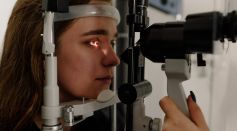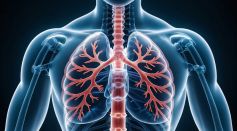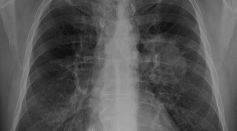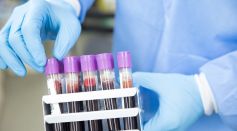Tags: Lung cancer

Honeybees Can Detect Lung Cancer Through Human Breath, MSU Research Finds; Could These Tiny Pollinators Be Heroes of Medicine?

Sudden Blindness Turns Out To Be Symptom of Tumor Growth in a Woman’s Lung; What Is Metastatic Cancer and How Is It Acquired?
AI Combined With Medical Imaging To Extract Information About Lung Tumors Provides Virtual Biopsy for Cancer Patients
How One Gets Lung Cancer Without Smoking?

AI Model Assesses Lung Cancer Risk of Non-Smokers, Never-Smokers by Looking at Just One X-Ray Scan

Tumor Suppressor Protein Inhibits Growth of Lung Cancer, Holds Key in Developing Drugs Against Carcinoma

Post-Surgery Lung Cancer Return Could Be Predicted Better by Observing Healthy Tissue Than Tumors, Study Suggests
Small Cell Lung Cancer Therapy Provides New Approach to Overcoming Chemotherapy Resistance
AstraZeneca Daily Pill Effectively Reduces Lung Cancer Deaths in Half, According to Large Clinical Trial
Kathy Griffin Says Her Doctors Think Her Lung Cancer May Have Been Caused by Radon Poisoning

Smoking Cigarettes Increases Risk of Developing 56 Kinds of Illnesses

This Robot Can Treat Lung Cancer Before It Gets Worse!

Air Pollution Triggers Lung Cancer in Non-Smokers by Increasing Gene Mutation Linked to the Disease

Lung Cancer Linked to Air Pollution: Scientists Demonstrate How Vehicle Exhaust, Smoke May Trigger the Chronic Illness in ‘Never Smokers’

Lifelong Smokers Rarely Develop Lung Cancer, Scientists May Know Why

AI Tool Developed to Assess Lung Nodule Captured by CT Scans for Benign and Malignant Cancer

High Risk of Brain Tumor, Lung Cancer in Communities Living Near Wildfire Hotspots Discovered

Lung Cancer Patients Found More Effectively Responding to Immunotherapy; New Gene Linked to Autoimmune Disease Detected

Magnetic Tentacle Robot Developed for Easier Bronchial Tree Observations and Lung Operations

Persistent Lung Cancer: Personalized Blood Test Could Detect Tumor to Select Best Treatment Options
Most Popular

Largest Known Volcanic Aquifer Discovered Beneath Oregon's Cascades

New 'Supergiant' Sea Bug Found in South China Sea, Named After Darth Vader

Mediterranean Sea Was Refilled by a Catastrophic Flood Millions of Years Ago

Mysterious Cosmic Waves That Sound Like Birds Detected in Unexpected Space Region





